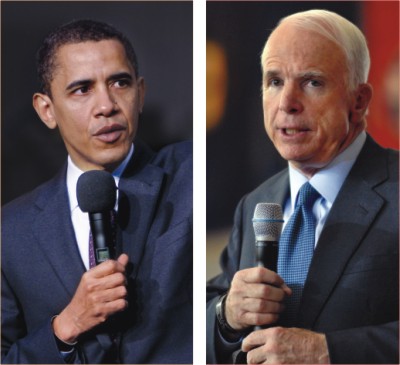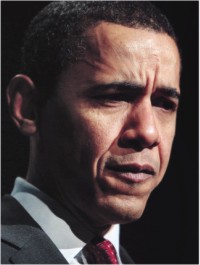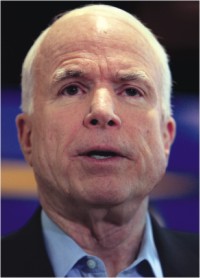
Inside
|
Two Choices,Two Worlds
Mridul Chowdhury examines what the upcoming US presidential election means for the rest of the world American elections have always fascinated me -- somewhat analogous to the suspense and the excitement of seeing an Olympic race, with the added benefit of following it for several months and then watching the finale over a bowl of pop-corn or chanachur, depending on whether I am over there or at home. The fact that I am not an American and cannot vote gives me more reason to take only an "academic" interest in US's elections, with the implicit notion that it is not going to make too much of a difference as to who wins or loses -- they are all beholden to the same interest groups anyway. This time, however, my personal experience in following the race has been strikingly different -- I feel that the stakes for the world may be much higher than any of us may imagine. The results of the US's elections this year will have far-reaching consequences on peace and stability across the globe, and Bangladesh will inevitably be affected as well. Since World War II, the human race has been gradually moving towards a more stable world. With the end of the Cold War, there is a much smaller chance that conflicts can spread beyond the particular geographic location it starts in, also helped by the presence of organisations such as the United Nations and NATO, which provide more avenues for external pressures when a nation takes a belligerent action. However, the one nation for which external pressures do not work well on is obviously the US -- hence the ever-increasing importance of having a responsible person at the helm of this nation. A good choice can lead to a world that is more stable, and a bad choice can reverse much of the progress made over the past decades, excluding the setbacks caused by the Bush family. While it is true that on many issues, the difference between the two presidential candidates is nothing more than rhetoric, there are some critical distinctions that set them apart. Senator John McCain, a former navy officer and Vietnam War hero, stresses that he has the critical national security experience and the background to win wars for the US. Senator Barack Obama, half-Kenyan and partially raised in Indonesia, stresses that his multi-dimensional background gives him the credentials to help rebuild diplomatic relations with the rest of the world, even with belligerent states. Their contrasting emphasis on various foreign policy issues, and their divergent perspectives of the US's role in global politics, are telling barometers for deciding who is better suited to lead the US in contributing to a safer and cleaner world. The war on terrorism: Calls for a new strategy A fight against another country and a fight against non-state actors call for different strategies and "weapons." A country is beholden to economic interests, and its government has some level of vulnerability to its citizens' adverse public opinion, no matter how autocratic it is. On the other hand, a non-state actor is neither tied to economic interests nor is it accountable. In today's age of globalisation and economic inter-dependence, there are many economic and diplomatic "weapons" at one's disposal to fight countries. It is imperative that the commander-in-chief of the country leading the war against terrorism understands the fundamental distinction between these two kinds of war in today's world, and is more cautious about loosely labeling countries as "enemies." McCain clearly falls short in demonstrating this understanding. McCain's rhetoric presupposes that he has figured out who the bad guys are. He is making aggressive attempts to prove he can be the tough commander-in-chief who can take bold decisions to subvert "enemies." His speeches are full of the words "winning" and "losing": no doubt a manifestation of his military background that spans several generations -- his father and grandfather were both decorated military officers. McCain insists that a military victory in Iraq is an essential component of the war on terror and strongly supports greater military build-up in Iraq to ensure it. Since his 2002 co-sponsorship authorising the use of force in Iraq, he has repeatedly stated that he is willing to lose a campaign rather than lose the war in Iraq. Obama, on the other hand, takes a much more nuanced view -- he is critical of McCain's attempts to divide the world into good and evil camps. He has been thoroughly critical of the US's intervention in Iraq from the beginning, and has never moved from his position against military build-up in Iraq. He often reminds American citizens of the blatant foolishness behind the war and in labeling Iraq, the country, as an "enemy." In a speech in West Lafayette, Indiana on July 16, he asked Americans to take a step back and think strategically about the national security problems facing the nation. He said: "After 9/11, we invaded and occupied a state that had no collaborative relationship with the al-Qaeda. We have spent almost a trillion dollars to occupy a country in the heart of the Middle East that no longer had any weapons of mass destruction." In contrast, McCain insists on linking the war on terrorism with the war in Iraq, even though the premise on which Bush started the war has been proven to be false. McCain's display of "toughness" is also demonstrated by his uncompromising stance Iran. He proposes tough economic sanctions and political isolation, and if these do not make Iran adhere to US-imposed restrictions on its nuclear program, he will consider military action. In order to justify his stance on Iran, in a speech in Amman, he said: "It's common knowledge and has been reported in the media that al-Qaeda is going back into Iran and receiving training and are coming back into Iraq." He forgot the reality that the Sunni-dominated al-Qaeda has cold relations with the Shi'ite Iran. A day after his speech, McCain spokesperson publicly announced that his boss "misspoke." Obama has maintained restraint in using belligerent language aimed at Iran, and has even questioned whether Iran actually wants to build nuclear weapons. On his campaign website, it states: "Iran has sought to build nuclear weapons" as opposed to making a provocative statement such as "Iran is seeking to build nuclear weapons." In one of his speeches, he stated that he would try to engage the Iranian regime in diplomatic and economic dialogue by offering Iran membership into the World Trade Organisation, and even offered to meet Iranian President Ahmadinejad. In response, McCain launched a shrill criticism aimed at Obama's "lenience" with Iran -- again proving that McCain unfortunately lacks strategic understanding of today's global political dynamics and the forces of economic inter-dependence supported by globalisation. Is the "my way or the highway" approach a solution? Both Obama and McCain have stressed on moving away from Bush's largely unilateral foreign policy of the last eight years. But here again, they diverge in important ways. Obama's approach to multilateralism has the United Nations as an important component. While he stresses on the importance of reform within the organisation, particularly the UN Security Council, he contends that the US should play a leading role in the UN, in sharp contrast to Bush's policy of ignoring the UN for the most part, and allowing roughly $2 billion in debt to the UN to remain unpaid. Obama has been a sponsor of the Global Poverty Act which would require the US president to develop and implement a comprehensive strategy to further the UN's Millennium Development Goals, and also to insist that Congress "pay the US dues on time, in full, and without improper conditions." McCain, on the other hand, has downplayed the importance of the UN and has dodged media queries about the huge amount of US dues to the UN. He has instead chosen to initiate the concept of a new international organisation called the "League of Democracies," whose membership will be made up of democratic governments. Some noted analysts, including the well-respected Washington DC-based think-tank, Citizens for Global Solutions (CGS), argue that this will severely undermine the UN. By restricting its composition only to democratic countries, McCain may end up recreating schisms that ended with the Cold War. McCain's propensity to form coalitions with the countries he likes, and leaving out the ones he does not, can have far-reaching consequences with respect to destabilising the globe yet again. Of particular importance are McCain's repeated indications that he wants to politically isolate Russia and China from the "free world." It is a reversion towards treating the world not as a diverse, organic whole, but turning it into a clear divides of "us" and "them." During McCain's major public policy speech in March, in a blatantly belligerent statement, he said: "We should start by ensuring that the G8 again becomes a club of leading market democracies: it should include Brazil and India but exclude Russia." The G8 is a group of industrialised countries that meets to discuss not only economic issues but also global politics and other issues of common interest. Insisting that Russia be kicked out of such an organization and conspicuously ignoring China are likely indications that McCain is more hawkish than even Bush when it comes to forcibly maintaining the US political hegemony. While Obama wants to increase diplomatic ties and economic inter-dependence and pursue an inclusive foreign policy with Russia and China to jointly tackle the world's problems, McCain clearly has exactly the reverse isolationist strategy with a misdirected hope that keeping them away from global elite bodies will make them want to change their policies and political ideologies. Leading by example or instruction?
Obama seems to follow the concept of "leading by example" better than McCain does, particularly in cases of nuclear proliferation and environment. McCain, while pursuing an aggressive rhetoric of restricting other countries' nuclear ambitions, has voted against the US ratification of the CTBT, has strongly supported the missile defense programs, and has used language that would leave scope for building new nuclear weapons. On the other hand, Obama has consistently tried to create bi-partisan consensus in ratifying the CTBT, has opposed developing new nuclear weapons, and has promised steps to ultimately move towards a "world where there are no nuclear weapons." McCain has also been strongly in favor of significant build-up of the US military, by adding 150,000 soldiers if he is elected, while Obama has promised adding 65,000 soldiers -- an indication that both candidates may be beholden to the interests of military contractors, but that Obama exercises noticeably more restraint. In environmental matters, both McCain and Obama seem determined to make up for past errors, but the difference in the degree of determination is striking. For instance, Obama would like to see the US reduce its greenhouse-gas emissions by some 80 percent by 2050, while McCain supports cutting back by 65 percent. However, in general, McCain has been far less transparent about environmental issues than Obama. The League of Conservation Voters, America's leading voice for environmental advocacy within electoral politics, has given Obama a lifetime score of 87 (out of 100) and McCain a score of 24, based on their voting behaviour in the Senate on environmental issues. Choosing between two worlds: The world's fate in hands of American voters
It is not inconceivable that McCain's isolationist policies towards Iran, Russia, and China may create a situation where China and Russia may more directly aid Iran's nuclear ambitions, which they have already been silently supporting through various deals. This may very well lead to yet another military confrontation, which can have far worse consequences than the Iraq War. McCain seems to ignore, or consciously chooses to overlook, the fact that if countries like Iran have to be contained diplomatically, strategic cooperation of Russia and China must be ensured. Skeptics such as Noam Chomsky and Arundhati Roy would say that the US always needs a war to keep its military-industrial complex alive and growing, and perhaps McCain is the latest puppet in that demonic scheme to justify impending military action through the "holy cover of democracy" -- a maneuver that the US government has already demonstrated well-developed skills in. More pragmatic political analysts such as Fareed Zakaria, the editor of Newsweek, would suggest that isolationist and heavy-handed policies under current global dynamics could not lead to fruitful results. On the other corner of the "duel," we have Barack Obama, who is better suited than McCain to lead the US in the emerging World Order -- someone who speaks in terms of trying to "understand the enemies and their motivations," talks about building coalitions with governments regardless of whether they share American values of democracy and civil rights, and wants to demonstrate commitment on global issues through leading by example. It is true that Obama is not a saint -- he possibly could not come this far if he was -- as the game of politics is much too harsh. For instance, his stance on the Israeli-Palestinian conflict has particularly disappointed many of his well-wishers. While being open about talking with the Iranian president, he has maintained a "no-negotiation" policy with Hamas, the democratically elected representative of the Palestinians. Despite such shortcomings, when the choice is between Obama and McCain, the answer is overwhelmingly clear. However, many Americans prefer a macho leader who can "scare" the world into submission if need be, and McCain certainly fits the profile. Many view Obama's emphasis on diplomacy and soft attitude towards mortal enemies such as Iran as signs of weakness and political naiveté.
If the US's election was open to all citizens of the world, Obama would perhaps win hands down. But unfortunately, it is not, and the stability and peace of the world is for the American people to decide -- most of whom understandably care more about domestic issues rather than foreign policy ones. However, I certainly hope that they live up to this grave global responsibility and choose the candidate who aspires to use America's influence on global affairs with more grace and humility or what the US Declaration of Independence calls "a decent respect to the opinions of mankind." The author acknowledges comments on early drafts by A.M. Choudhury, Carlie, Cindy, Mary, Maya, Muhit, Rubayat, Rupert, Shafique, Shehzeen, Yuko, and members of Drishtipat Writers' Collective. Mridul Chowdhury is the CEO of a global social business venture in e-Health and a contributor to "Harvard for Obama" campaign. |
|||||||



